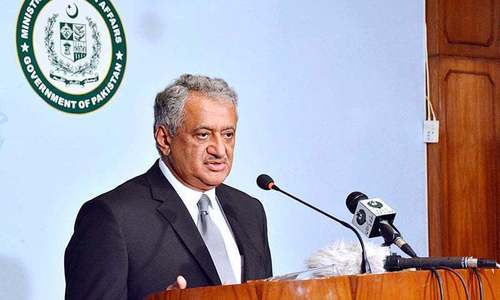ISLAMABAD: Adviser to Prime Minister on Foreign Affairs Sartaj Aziz admitted on Monday on the floor of the Senate that Pakistan was still unaware of full details of the Saudi-led coalition against terrorism and cautioned parliament against “complicating” the process by “prematurely” discussing it.
Taking note of the remarks, Senate Chairman Raza Rabbani reminded Mr Aziz that “we are discussing the matter in parliament and not at any other forum”.
Mr Aziz could not give satisfactory answers to specific questions of the chairman and some opposition members on the issue.
Tahir Mashhadi of the MQM walked out of the house saying that the adviser had not replied to questions raised in his speech.
“I may clarify that it is not an alliance, but a coalition because alliance is more formal. We will come to parliament once details are available,” said Mr Aziz in reply to the speeches made by senators during a debate on the motion seeking discussion “on the government’s foreign policy with reference to its success and failure”.
“So you have joined a military alliance about which you are still foggy,” the Senate chairman remarked.
The adviser said every country had to decide which activity it was going to participate in, “so there is no compulsion of doing XYZ”.
“We are working out... consultations are in progress to work out as to which kind of activities are we going to participate. There is intelligence sharing, capacity-building ... we are yet to decide which activity is desired. We support every action against terrorism,” he added.
The house witnessed an exchange of remarks between Mr Rabbani and Mr Aziz over the issue of bypassing parliament while taking major decisions.
Adviser could not satisfactorily answer questions of Senate Chairman Raza Rabbani and opposition members on the issue
“You have decided to become part of a coalition without being able to inform parliament about its details?” said Mr Rabbani.
The adviser gave an interesting reply, saying: “All the 34 countries, including Turkey, have done the same thing.”
“I am not interested in 33 other countries. I am interested only in the 34th country which is Pakistan,” the chairman said in a harsh tone.
Asked about the ministry’s viewpoint on the exclusion of four countries, which were subject to terrorism and fighting the militant Islamic State group, from the alliance, the adviser said that the matter would be discussed at the OIC forum in February.
Mr Aziz claimed that the discussion on the proposal had been going on for a couple of months. “So we know a little bit about it. But rest assured that we are not going to deviate from the (foreign) policy and details would be shared with the house when they became available.
He said terrorism was an important issue for the Muslim world and, therefore, they should not pre-judge the matter and allow the process to go on.
“It is important that today all trouble spots are in the Islamic world. If we don’t take the measures, they will come to our side. Our main interest is that IS does not find space in South Asia,” he said. “It is important for us to join (coalition) according to whatever priorities we have.”
Earlier, opposition members criticised the government for not appointing a full-time foreign minister and bypassing parliament over major decisions.
Tahir Mashhadi asked the adviser to tell the house against whom this coalition had been formed. He termed the decision to join the alliance a violation of the decision of a joint sitting of parliament on the Yemen situation.
Saudi Arabia announced on Tuesday that it had forged the 34-nation alliance of Muslim countries for fighting terrorism and extremism, which included Pakistan.
Senior officials at the foreign ministry initially expressed surprise over Pakistan’s inclusion in the new group, and said Riyadh had not taken Islamabad on board. But subsequent developments revealed that Saudi Arabia had been given a secret commitment regarding joining the alliance, about which the Foreign Office was not aware.
CCI: During a debate on a motion, opposition members accused the government of violating the constitution by not convening a meeting of the Council of Common Interests since March.
Hasil Bizenjo of the National Party said that efforts were on to roll back the 18th Amendment which granted greater autonomy to the provinces.
The Minister for Inter-Provincial Coordination, Riaz Pirzada, said the CCI meeting could not be called because of some pressing engagements of the prime minister. He expressed the hope that the CCI would meet by the third week of January.
The chairman referred a private members’ bill seeking restructuring of Ogra to the standing committee concerned. The bill seeking representation of all the provinces in Ogra had been introduced by PPP’s Sassui Palejo.
Published in Dawn, December 22nd, 2015











































